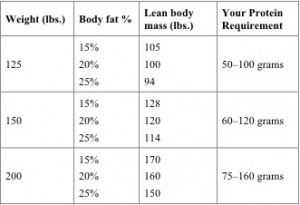About one in ten clients I see in my office is not eating enough protein, and it’s causing symptoms as diverse as forgetfulness, panic attacks, osteoporosis and migraines. How do you know your protein needs? It’s a little math, but pretty simple.
We break down proteins all day long – fasting overnight, exercise, little stresses, and just thinking utilizes proteins that are broken down and require replacement. Your mass of muscle, bone and connective tissue require the bulk of protein replacement from day to day. So your lean body mass is used to calculate dietary protein requirements. The conversion is a little odd I know, as it drifts from pounds to grams but here it goes.
You need 0.5 to 1.0 gram per pound of lean body mass (LBM). (For metric, this is 1.1 to 2.2 grams of protein per kg of lean body weight.) LBM is your total body weight minus your percentage of body fat. This number comes from your skin-fold calipers. Strenuous exercise and exertion will increase your body’s demand for muscle and tissue repair, and, subsequently, dietary protein needs will be on the higher side of the range.
What about too little protein?
While your body can survive on less protein, recovery will be compromised, such as recovery from an illness, or recovery from an injury or activity. Perhaps you can live successfully on less protein than .5 grams/pound of LBM if you are older, celibate, passive, and with no underlying health problem.
What protein amount is “just right” for you?
When you restrict dietary carbohydrates in your Blood Code Diet, you will be eating more from dietary proteins and fats. To review, your body produces the hormone insulin primarily in response to carbohydrate intake, but you also release some insulin—about one-third less insulin than carbs—in response to dietary protein.[i] Research has confirmed that ample dietary protein in a carbohydrate-restrictive diet improves the maintenance of lean body mass during weight loss, the control of blood sugars, and self-regulated appetite control. [ii] Adequate protein at breakfast is especially important for weight loss, blood sugar control, mood, and concentration.
If you are insulin-resistant and physically active, protein in the meal following a strenuous workout will release plenty of insulin, and will support your muscle mass. But if you add a bunch of carbs to your protein, like rice with boneless/skinless chicken, you will have way too much insulin release. This is probably why traditional cultures prepared proteins and carbs with plenty of dietary fat.
[i] Bernstein, R. Diabetes Solution. Little Brown & Co., 2007.
[ii] Layman, D., et al. Increased dietary protein modifies glucose and insulin homeostasis in adult women during weight loss. J. Nutr. 2003 Feb; 133:405–10.





Comments are closed.